

The United States' Failing Food System. October 1, 2007 | Like this article?
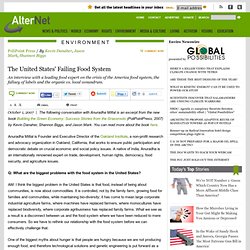
Join our email list: Stay up to date with the latest headlines via email. The following conversation with Anuradha Mittal is an excerpt from the new book Building the Green Economy: Success Stories from the Grassroots (PoliPointPress, 2007) by Kevin Danaher, Shannon Biggs, and Jason Mark. You can read more about the book here. Anuradha Mittal is Founder and Executive Director of the Oakland Institute, a non-profit research and advocacy organization in Oakland, California, that works to ensure public participation and democratic debate on crucial economic and social policy issues.
Q: What are the biggest problems with the food system in the United States? AM: I think the biggest problem in the United States is that food, instead of being about communities, is now about commodities. The real problem is the absence of living-wage jobs. Basically we have been turned into guinea pigs. AM: It's a big mess. Q: Tell us about GMOs and U.S. foreign aid. Does food security's future lie in organic seeds? You’d be hard pressed to find a young visionary quite as passionate about the organic seed movement than Matthew Dillon of Seed Matters.
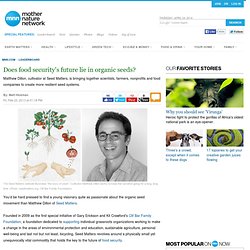
Founded in 2009 as the first special initiative of Gary Erickson and Kit Crawford’s Clif Bar Family Foundation, a foundation dedicated to supporting individual grassroots organizations working to make a change in the areas of environmental protection and education, sustainable agriculture, personal well-being and last not but not least, bicycling, Seed Matters revolves around a physically small yet unequivocally vital commodity that holds the key to the future of food security. Food & Class: Moving Away From the Personal Choice Narrative. It’s hard to get behind any food movement (if it can even be categorized as such) these days.
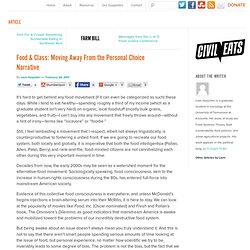
While I tend to eat healthy—spending roughly a third of my income (which as a graduate student isn’t very hard) on organic, local foodstuff (mostly bulk grains, vegetables, and fruit)—I can’t buy into any movement that freely throws around—without a hint of irony—terms like “locavore” or “foodie.” Still, I feel lambasting a movement that I respect, albeit not always linguistically, is counterproductive to fostering a united front. CAScade: Q&A: Food, Justice and the Power of Narrative. How Literature Informs and Influences Our Relationship to Food Faculty expert Allison Carruth is an assistant professor of English.
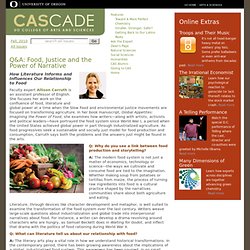
Why Food Should be a Commons Not a Commodity. Comparing US Food System & Health Care Stats. I just [in March] completed my second MOOC, entitled An Introduction to the U.S.
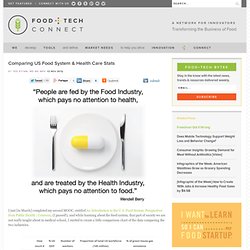
Food System: Perspectives from Public Health | Coursera, (I passed!) , and while learning about the food system, that part of society we are not really taught about in medical school, I started to create a little comparison chart of the data comparing the two industries. I’ve compiled all the references in this happy link cloud. Feel free to click through to verify or improve the accuracy of the data. I thought the comparison was interesting because one might expect that these two would collaborate to make each other successful, which would mean a healthy workforce and healthy society. Outlook - blacksunshine52. Stop Preaching to the Converted.
Food+Tech Connect and GRACE Communications Foundation present Hacking Meat, an online conversation exploring how information and technology can be used to hack (or reimagine) a more sustainable, profitable and healthy future for meat.
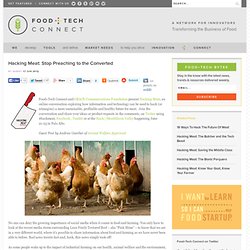
Join the conversation and share your ideas or product requests in the comments, on Twitter using #hackmeat, Facebook , Tumblr or at the Hack//MeatSilicon Valley happening June 21-23 in Palo Alto. Guest Post by Andrew Gunther of Animal Welfare Approved No one can deny the growing importance of social media when it comes to food and farming. You only have to look at the recent media storm surrounding Lean Finely Textured Beef – aka “Pink Slime” – to know that we are in a very different world, where it’s possible to share information about food and farming as we have never been able to before. Bad news travels fast and, heck, this news simply took off! But agriculture – despite Big Ag’s best efforts – doesn’t suit itself to 140 characters. Hacking the Food System Round Up. Food+Tech Connect asked leading food and technology innovators – how can information and technology be used to hack the food system?
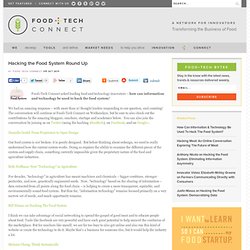
We had an amazing response – with more than 27 thought leaders responding to our question, and counting! The conversation will continue at Food+Tech Connect on Wednesdays, but be sure to also check out the contributions by the amazing bloggers, ranchers, startups and academics below. You can also join the conversation by joining us on Twitter (using the hashtag #foodtech), on Facebook, and on Google+. Danielle Gould: From Proprietary to Open Design Our food system is not broken- it is poorly designed.
Beth Hoffman: New “Technology” in Agriculture. Food Tech Connect. Hacking the Food System Round Up.